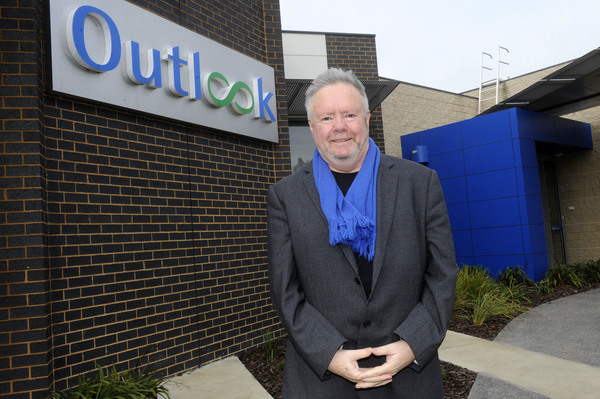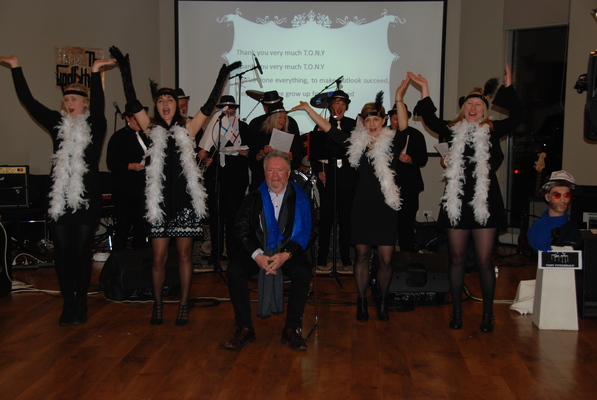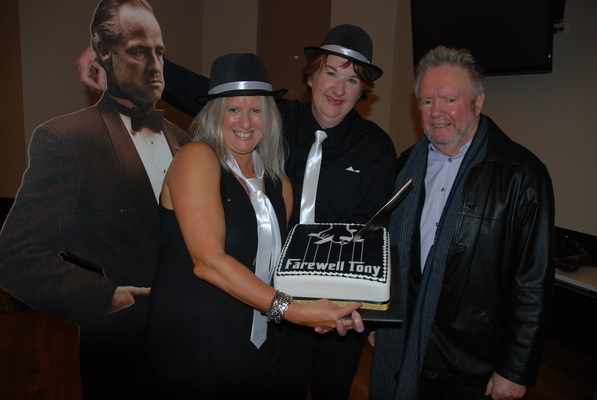
By GARRY HOWE
Out of left field, Tony Fitzgerald was at the forefront of transforming lives of disabled people in this country and overseas. GARRY HOWE reports.
THE chorus of praise heaped upon retiring Outlook CEO Tony Fitzgerald at a farewell function on Friday night had a common theme.
He has helped change many lives.
Those disadvantaged people who have benefitted from his 27 years at the helm of the Pakenham-based social enterprise have Tony’s own life-changing experience to thank for that.
His social conscience was pricked very early in life, growing up as one of eight children in a Housing Commission area of Reservoir amid poverty, homelessness and gang culture, where the abuse of women, children and drugs was the norm.
But it was his experience as a welfare worker for the Brotherhood of St Laurence in the early 1980s that had a profound effect on his life.
The State Government of the day had decreed that the disabled were to be deinstitutionalised and Tony and his colleagues were assigned the task of getting that done.
“A vast majority of disabled people were locked up and suffered physical and sexual abuse,” he recalled.
“Some lived behind bars in accommodation that can only be described as dungeons. They were being treated worse than prisoners, yet they hadn’t done anything to anyone.
“They say the measure of poverty is a person’s access to education, access to a family and loving relationship, access to housing and access to employment.
“Well, these people had none of those basic human rights. They suffered more than anyone.
“When I saw that, it had a profound impact on me.”
One particular client in an institution did not speak, according to staff. Tony took an interest in him and, when leaving one day, the man yelled out across the room: “Goodbye Tony”.
Staff members were stunned and one asked Tony how he had achieved that. “Mate, have you ever tried to talk to him,” came his incredulous reply.
In 1989, Tony found his way to Pakenham, applying for the job of heading up an operation then known as Minibah.
Its chairman back then, current McMillan MP Russell Broadbent, recalled it was a critical time for the organisation.
Minibah essentially began as a day care centre for the relief of parents, then became a school for disabled children.
In the late ‘80s, the new Kirner Government advocated the integration of disabled children into mainstream schools, which changed the goalposts again and the organization had to redefine itself.
“It was a time of turmoil and change and we needed someone who understood that change,” Russell recalled.
Tony was one of several applicants for the position and presented as “the worst dressed and worst presented applicant I have ever come across”, Russell recalled.
“He was out of left field – not like me, not like Pakenham at the time.”
It was a time when the disabled were not in the community; kept at home or on the farms and weren’t taken anywhere. Hidden away from society.
When he recommended to the board that Tony be appointed, they thought he was joking. But Russell saw something in him.
“It was a time to change and Tony seemed to me just strange enough to pull that off.
“He proved to be totally different to what many people expected. He turned out to be a great deal maker and an entrepreneur. He had an understanding of where we wanted to go.”
When he started at Minibah, Tony devoured the Disability Services Act of 1986 and every Friday he would run through sections of it with staff and clients so they all understood it – a process he describes as empowerment through participation.
At its core was the requirement to restore basic human rights and locally the brief was to oversee the closure of day services and to get people included into mainstream community.
Tony bristles at the term ‘sheltered workshop’ and what eventually became Outlook operates under the more acceptable term of a ‘social enterprise’ – and it’s a ground-breaking one at that.
He doesn’t use the term ‘disabled’. He prefers to refer to people as being ‘disadvantaged’ and sets out to make them less so.
“You listen to people and you build your service around the need,” he said, adding forcefully: “Don’t just hear – really listen.” (Remember that client they said couldn’t speak?)
Not long into his tenure, Tony led Outlook into the recycling and refuse environment, a move that won him recognition in 2003 as being among The Bulletin magazine’s Smartest 100 people.
Outlook became the first organisation in Australia to pay its clients award wages and now many work in open employment.
His influence soon spread and he began shaping the national disability agenda, as evidenced by a story Russell shared at the launch of a book outlining Outlook’s history back in 2014.
As the story goes, in the late ‘90s Tony got wind of a change mooted by the newly elected Howard Government to abolish a mobility allowance that helped the likes of Outlook transport their clients.
He got straight on the phone to the McMillan MP who set about convincing those in the corridors of power to reverse the decision to cut the crucial $6 million initiative.
Russell did not endear himself to John Howard or the relevant Minister Jocelyn Newman and was even jeered by his colleagues in the party room for breaking protocol to speak twice on his motion to have the allowance reinstated.
But persistence paid off and not only did the government reinstate the $6 million allowance, but increased it 10-fold to allow it to be spread more widely.
Russell recalls being reduced to tears when he got a phone call while driving between Morwell and Drouin, with Ms Newman and her chief of staff claiming to have fixed the problem.
“No, they didn’t fix the problem,” he told guests at the book launch. “Tony Fitzgerald fixed that problem and it started with that phone call.”
That theme carried through to last Friday night, with Edwin Hume also lauding Tony’s deal-making abilities.
“Tony loves talking about the days when he lived at Reservoir and the lasting effect that had on him,” Edwin said.
“The passion of the boy from Reservoir is apparent when he’s fighting for Outlook. His tenacity is sometimes scary.
“We (the board) joke about occasionally not feeding Tony, then letting him loose at unsuspecting and underestimating multi-national company executors or well-meaning paternalistic bureaucrats or whoever.
“His tenacity of Outlook and Outlook clients is exemplary, visionary and, hopefully, long-lasting.”
Edwin used a quote from a former US president, which he said sums up Tony’s stills of negotiation: “When you can’t make them see the light, make them feel the heat”.
He said Tony often talked about whether people got it; whether they really understood what Outlook was about.
“He has left his stamp indelibly ingrained on the organisation. His understanding of social justice in economic and a real achievable sense is what I take from my experience with Tony.
“The tenacity Tony has is because he genuinely believes in the rights of the disabled and their opportunities and their need to demystify their lives and to give them normal opportunities.”
Reflecting upon his career, Tony said the recognition late last year as one of five finalists in a national Human Rights Commission award gave him his greatest thrill.
The Tony Fitzgerald Memorial Award – in honour of the former NT Anti-Discrimination Minister of the same name – acknowledges individuals who strive for a fairer and more equal society for all people.
After all, that’s what he’s all about.
On a lesser scale, Tony was named the Gazette’s Person of the Year in 2014 on the strength of a record year for Outlook and one where it celebrated its 45-year history with the launch of a book and formed the All Together Choir under the tutelage of Jonathon Welsh of Choir of Hard Knocks fame.
Flicking through the many retirement messages from well-wishers was also a humbling experience.
“What a legacy you have left behind you,” Jonathon Welsh wrote.
Another message came from Japan. Not many people realise he was invited over there several times to help integrate the country’s day service models.
But the one that really hit home was when a colleague described Tony as “the Les Twentyman of the east”.
Russell Broadbent probably best summed it up on Friday night when he said Tony “has a heart and a mind and a hand for people with disabilities”.
“He really changed the world for many individuals and their families.”









